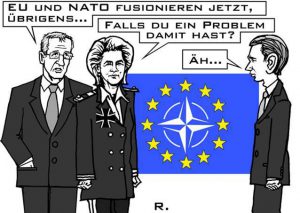
Das kann schon mal dabei herauskommen, wenn man als Neutraler auf der großen Bühne mitspielen möchte. Man kann ja wieder zwei Soldaten auf die Golan-Höhen schicken, oder ähnlich… in UN-Mission.
Mehr Beiträge wurden zuvor doch auch kaum geleistet, oder? Hier einmal die Verbindungen zwischen NATO und EU:
Sharing strategic interests and facing the same challenges, NATO and the European Union (EU) cooperate on issues of common interest and are working side by side in crisis management, capability development and political consultations, as well as providing support to their common partners in the east and south. The EU is a unique and essential partner for NATO. The two organisations share a majority of members, have common values and face similar threats and challenges.
Na, da steht’s, ist doch alles klar, oder nicht? Die Kriegstreiber Stoltenberg und Uschi v.d.L weisen den Weg!
Relations between NATO and the EU were institutionalised in the early 2000s , building on steps taken during the 1990s to promote greater European responsibility in defence matters (NATO-Western European Union cooperation1).
The 2002 NATO-EU Declaration on a European Security and Defence Policy (ESDP) reaffirmed EU assured access to NATO’s planning capabilities for the EU’s own military operations.
In 2003, the so-called „Berlin Plus“ arrangements set the basis for the Alliance to support EU-led operations in which NATO as a whole is not engaged.
At the 2010 Lisbon Summit, the Allies underlined their determination to improve the NATO-EU strategic partnership. The 2010 Strategic Concept committed the Alliance to working more closely with other international organisations to prevent crises, manage conflicts and stabilise post-conflict situations.
In Warsaw in July 2016, the two organisations outlined areas for strengthened cooperation in light of common challenges to the east and south, including countering hybrid threats, enhancing resilience, defence capacity building, cyber defence, maritime security and exercises. As a follow-up, in December 2016, NATO foreign ministers endorsed a statement to which were annexed 42 common measures to advance NATO-EU cooperation. A further 32 measures were agreed in December 2017.
On 10 July 2018, in a joint declaration, the two organisations agreed to focus on swift progress in the areas of military mobility, counter-terrorism and strengthening resilience to chemical, biological, radiological and nuclear-related risks as well as promoting the women, peace and security agenda.
Allied leaders welcomed this joint declaration at the Brussels Summit in July 2018 and tangible results achieved since 2016. They recognised that the development of European defence capabilities, while ensuring coherence and complementarity and avoiding unnecessary duplication, is key in joint efforts to make the Euro-Atlantic area safer and contributes to transatlantic burden-sharing..
Close cooperation between NATO and the EU is an important element in the development of an international „comprehensive approach“ to crisis management and operations, which requires the effective application of both military and civilian means.
NATO and the EU currently have 21 member countries in common.
At that time, the Western European Union (WEU) was acting for the European Union in the area of security and defence (1992 Maastricht Treaty). The WEU’s crisis-management role was transferred to the European Union in 1999.
30 NATO member countries: Albania, Belgium, Bulgaria, Canada, Croatia, Czech Republic, Denmark, Estonia, France, Germany, Greece, Hungary, Iceland, Italy, Latvia, Lithuania, Luxembourg, Montenegro, the Netherlands, North Macedonia, Norway, Poland, Portugal, Romania, Slovakia, Slovenia, Spain, Turkey, United Kingdom, United States.
27 EU member countries: Austria, Belgium, Bulgaria, Croatia, Cyprus, Czech Republic, Denmark, Estonia, Finland, France, Germany, Greece, Hungary, Ireland, Italy, Latvia, Lithuania, Luxembourg, Malta, the Netherlands, Poland, Portugal, Romania, Slovakia, Slovenia, Spain, Sweden.
